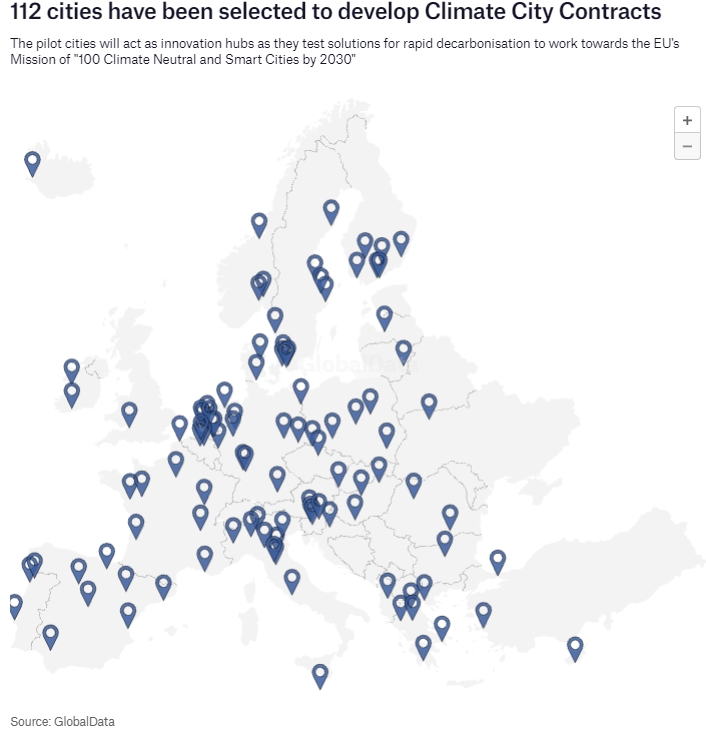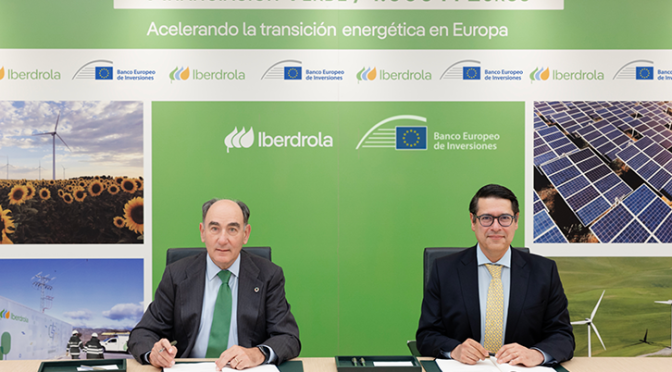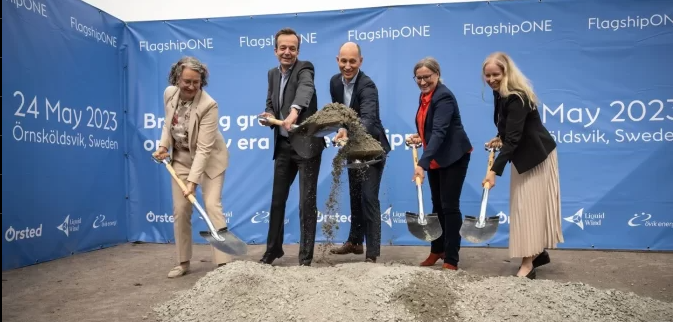
An estimated €650bn ($707bn) of funding is needed to help over 100 European cities progress towards the 2030 carbon-neutral goal.
The cities are looking to raise funds for a variety of net-zero and climate-resilience infrastructure projects from public and private investors.
Net Zero Cities’ main financial partner Bankers Without Boundaries is providing advice to cities to help them gain access to public and financial finance.
“We are a group of former investment bankers who have moved away from the Bulge Bracket firms and are looking to do more to help the environment and public sector actors like cities,” Allison Lob, executive director of Bankers Without Boundaries, tells Power Technology‘s sister publication Energy Monitor.
Net Zero Cities
With cities accounting for more than 70% of global CO2 emissions and consuming 65% of the world’s energy – while also being home to 75% of EU citizens – it is clear why decarbonisation efforts are being focussed here.
Net Zero Cities is a part of the EU’s mission of developing climate-neutral and smart cities. The two main aims of the mission are to deliver 100 such cities by 2030 and to ensure that the cities act as experimentation and innovation hubs to enable all European cities to follow suit by 2050.
So far, 112 cities have been nominated across the EU. These are testing cross-sectoral approaches in order to secure finance, engage citizens and progress their path to climate neutrality.
Spanning across 35 countries, some of the cities taking part in the project include Malmö, Valencia, Porto, Warsaw, Riga and Thessaloniki.

Cities are at different stages in the process, from putting forward a Climate City Contract and investment plan to securing finance and starting the projects.
While decarbonisation is a key aim of the project, Lobb emphasises that climate resilience is also a key consideration for potential infrastructure projects.
“The reality is that the summers are getting hotter,” she says. “We are getting more rain. We are getting more flooding. And the cities that we live in need to be more resilient to those shocks that are coming through the system.”
Of this, GlobalData analyst Carolina Pinto says: “Urban areas must be redesigned to reduce the impact of climate change. This includes installing renewable energy sources, improving energy efficiency across existing buildings and homes, and redesigning transportation routes to promote public transportation and bicycles over cars.”
Climate City Capital Hub
The launch of the new Climate City Capital Hub will help cities gain access to the finance necessary to both decarbonise and make them more climate resilient.
Lobb explains that a lot of consulting work that cities pay for just gets filed away and not executed, whereas the Hub is aimed at helping cities access public and private finance so these projects can get underway.
Underscoring the need for private funding for cities, Pinto adds: “When national governments already have to spend public funds to address other net zero-related targets, it is easier to pass the cost of climate change to consumers rather than invest limited public funds to prevent rising energy costs. There is a need for private investment to address the gaps in public funding.”
According to Lob, the hub will “drive investor outreach and use our connectivity and networks to build climate finance for cities as an investment theme, in a way that hasn’t existed previously.”
She explains that, while Bankers without Boundaries already works closely with the European Commission and the European Bank to validate plans, the capital hub will help to drive private engagement.
“We want to engage the private sector in the discussions, early on, so that we can convert a lot more of them into actual investors in these projects,” she says.
Attracting private finance
According to Lobb, figuring out how to get the private sector more involved is the main way progress toward carbon neutrality will be made. A key part of this is getting private finance to recognise the financial potential of cities as an investment.
“There are numerous compelling reasons why European cities should be recognised as an asset class,” says Lobb. “Historically, cities themselves have not been included in traditional investment asset classes or frameworks. However, given their potential for growth, economic stability, and unique investment opportunities, it’s becoming increasingly clear that they should be.”
“These are European cities, their credit risk is very good and attractive, and they are lower risk investments than perhaps investors are making in other parts of the world. So it should be a good space to look for investment opportunities and move forward.”
Lobb emphasizes that the independent validation of cities' decarbonisation plans should help to boost the credibility of the projects, giving the private sector greater confidence.
“The validation by the European Commission speaks to the fact that a lot of due diligence has been done in the background,” she explains. “A lot of the problems with carbon markets or biodiversity credits are really around verification but these City plans have been validated independently.”
Lobb also highlights that it is not just impact funds that can target these projects. Utility companies, private equity investors and private infrastructure investors should all be looking at investing in these projects.
“You don’t necessarily have to have a particular impact mandate to be interested in these things,” she says. “It is broader than that.”
While the launch of the climate hub marks a good step forward, Lobb warns that the hard work is only just beginning.
“The hard work starts now. Getting people on board and getting anywhere near the €650bn onto the table is going to involve a lot of work and, importantly, a lot of innovation.”





